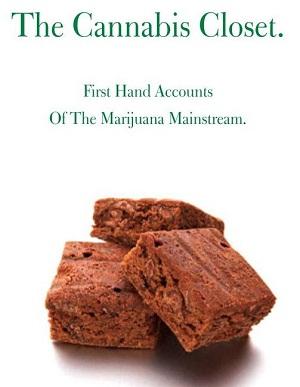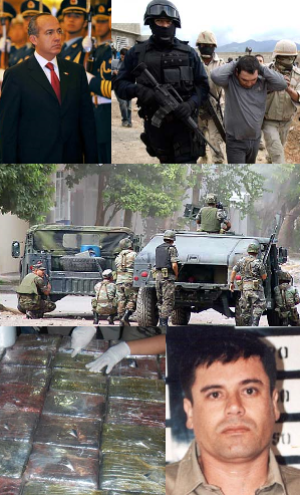While small-time meth criminals face years in prison, a wealthy corporation complicit in the trade walks away with a fine. Is it a case of you can have all the justice you can buy? Or does the system just focus on the easiest victims?
The Atlantic's Andrew Sullivan popular blog The Daily Dish has been the home of quite a debate about marijuana in the last year and a half. Now, "The Cannabis Closet" lets us in on the conversation.
The bloody insurgency in Afghanistan claimed more than 10,000 lives last year, but the death toll still trailed that of Mexico's prohibition-related violence.
It's a new year, but in Mexico, 2011 is already looking a lot like 2010, which saw prohibition-related violence kill more people than ever.
A Massachusetts SWAT team member killed an elderly Framingham man during a drug raid Wednesday morning. It was the first of 2011, but it probably won't be the last. With your help, the Chronicle will be reporting on every one.
Acting DEA head Michele Leonhart won unanimous approval from the Senate Wednesday to head the agency permanently.
The Associated Press has done a remarkably series of articles on the failures of the drug war. Here's a brief look at the first three -- and an invitation to read them all the way through.
Incoming Republican Florida Gov. Rick Scott has axed the state drug czar's office. That's one layer sliced off the drug war bureaucracy in Tallahassee.
The California Supreme Court has ruled that police don't need a search warrant to browse the text messages on an arrestee's cell phone. The Ohio Supreme Court 13 months ago ruled the other way. Look for the US Supreme Court to resolve this issue.
It's a Texas trifecta this week, plus a Nashville cop buying guns for the cartels, an ATF agent with sticky fingers, and an upstate New York cop with several bad habits.
TV evangelist Pat Robertson wants to legalize marijuana. -- Oh, wait, no he doesn't, but he thinks the law is counterproductive.
Part of Argentina's boisterous cannabis nation took to the streets of Buenos Aires last Saturday to celebrate a year of activism and call for further reforms.
Events and quotes of note from this week's drug policy events of years past.
special to Drug War Chronicle by Clarence Walker
[Editor's Note: Clarence Walker is a veteran Houston-based journalist who writes on criminal justice issues and who dearly wishes this piece was called "CVS in the Hood." He wishes all readers a Happy New Year! Walker can be reached at [email protected].]
Drug agents across the land pursue their endless war against methamphetamine with relentless vigor, busting tweakers daily and breathlessly trumpeting the seizure of yet another "meth lab," which these days often consists of no more than a couple of soda pop bottles and a few chemicals available from your general store. Yet in the relentless campaign against meth and its manufacturers, it seems some are more equal than others.
CVS, the largest operator of pharmacies in the United States,
confessed back in October that it knowingly allowed crystal meth manufacturers to illegally buy large amounts of pseudoephedrine (PSE), an active ingredient used in the manufacture of methamphetamine. To avoid criminal prosecution, CVS officials agreed to pay the federal government a $75 million fine for narcotics violations, the largest cash money penalty in the 40-year history of the Controlled Substances Act.
Although pseudoephedrine is a common ingredient in over the counter cold medications and is legal to purchase from drug stores in Canada and the US, because it can also be used to make methamphetamine, it is illegal for pharmacies to sell a person more than 3 1/2 grams of PSE per day. But DEA and state narcotic officers eventually learned that meth cooks were able to get around the law by employing "smurfs" -- people working with meth cooks who make repeated legal purchases of PSE at numerous different pharmacies.
As early as 2007, dealers targeted CVS, and according to the DEA, the top CVS officials were warned by employees of the illegal violations. DEA reported that the pharmacy's head honchos ignored the warnings and demanded the workers continue selling the large amounts of PSE in California and Nevada.
Authorities say CVS in effect assisted meth cookers by failing to provide adequate safeguards to monitor the legal amount of PSE that customers could buy. DEA said the violations occurred not only in California and Nevada, but in Arizona, Georgia, South Carolina and 23 other states currently under investigation. Between September 2007 and November 2008, CVS's illegal practice of overselling PSE products caused the DEA to tag them as the largest suppliers of pseudoephedrine to meth traffickers in Southern California.
US Assistant Attorney Shana Mintz said, "Rather than choosing to over-comply with the law like their competitors did, they knowingly under-complied with the law."
Federal agents began investigating CVS in 2008 after pseudoephedrine seized at Southern California meth labs was traced back to the pharmacy chain. News media stories reported that CVS installed an automated system called Meth Tracker to track individual sales but that the mechanism didn't stop multiple same-day purchases.
Around Los Angeles, smurfs would hit CVS locations and raid the shelves of PSE products and cough and cold medicine tablets. Prosecutors said that in LA County alone over a 10-month period in 2008, sales of pseudoephedrine products such as Contac, Sudafed, Dimetapp and Chlor-Trimeton increased more than 150% over the same period in 2007.
"
CVS knew it had a duty to prevent methamphetamine trafficking, but failed to take steps to control the sale of a regulated drug used by
meth traffickers as an essential ingredient for their poisonous stew," said US Attorney Andre
Birotte in a
statement after the settlement. "This case shows what happens when companies fail to follow their ethical and legal responsibilities," he added.
"This historic settlement underscores DEA's commitment to protect the public's health and safety against the scourge of methamphetamine," said Michele Leonhart, the acting administrator of the DEA, in a
statement. "CVS's flagrant violation of the law resulted in the company becoming a direct link in the meth suppy chain."
While the feds were busy patting themselves on the back, CVS was busy absolving itself. In a
statement, CVS Chairman and CEO Thomas Ryan said, "We have resolved this issue which resulted from a breakdown in CVS/pharmacy's normally high management and oversight standards." The lapse, Ryan said, "was an unacceptable breach of the company's policies and was totally inconsistent with our values."
Small-time meth cooks are routinely sent to prison for years for "drug manufacturing," and people who help them out by buying small amounts of PSE go up the river for conspiracy, but not corporate criminals like CVS. Did the millions CVS paid the government keep company leaders from being indicted on drug charges?
During the DEA investigation of the CVS pharmacies, over 50 people were charged with possession with intent to manufacture methamphetamine for purchasing the PSE products they bought illegally from CVS stores. Each defendant faces prison time, while CVS officials who knowingly allowed the illegal purchase of the drugs get off scot free by paying millions that eventually will be recouped.
The arrest of the CVS smurfs sparked a heated debate about equal justice and disparities in the treatment of small-time smurfs and big-time corporate entities. "It doesn't seem fair to let those like CVS that ignored the law and sold massive amounts of an ingredient to make that poison get away with just a fine. Yes, it's a hefty one, but they'll probably just raise prices to offset it," said Dean Becker, the Houston-based host of
KPFT radio.
"As always, the powers that be are utilizing fear and loathing to continue their eternal war. CVS and all the corporations that are subject to the oversight of the DEA are pawns in the game of fear," said Becker. "Why are people using CVS to make speed?"
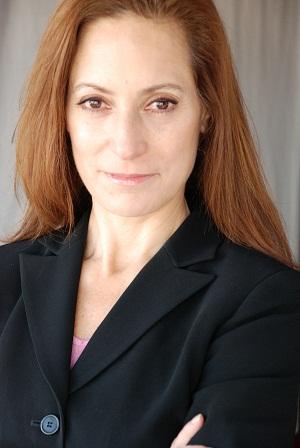
Attorney Diane Bass says her client has been punished disproportionately while corporate decision-makers go free.
No one is more infuriated with the disparity in treatments of drug offenders, particularly in the CVS case, than California attorney Diane Bass. Based in Laguna Beach, California, Bass represents one of the female defendants charged in federal court with possession with intent to manufacture the PSE drugs purchased from CVS.
"If this was any other drug case, CVS would be the 'source' of the drugs the government would be most interested in prosecuting, and CVS would receive the longest sentence," she told the Chronicle. "Here, CVS paid a fine of $75 million and walked away without facing criminal prosecution while the small players like my client who are meth addicts trying to earn a few bucks to buy their drugs are facing excessively long prison sentences. This isn't fair. It's outrageous!" Bass said.
"In my client's case, she needed the money to buy her medication for her illness. She's on SSI and had no money to pay for her medicine," the defense attorney explained. "These are certainly not the people that Congress intended to punish when it promulgated the PSE sentencing guidelines. I believe they intended to punish those who actually manufactured methamphetamine -- those whom my client sold the PSE cold medicine to."
Bass complained the disparity in treatment in this case is so unfair she will fight tooth-and-nail for her client to show how corporations break the law an only pay a fine, while the small fry goes to prison.
While corporate behemoths like CVS can buy their way out of trouble, that's not necessarily the case for Ma-and-Pa operations, like that of Oklahoma pharmacist Haskell Lee Evans Jr., 68, a member of the State Board of Health, who was
recently indicted for "recklessly" selling pseudoephedrine to make crystal meth -- the same act committed by CVS.
Evans, the owner of Haskell's Prescription Shop in Lawton, Oklahoma, allegedly sold pseudoephedrine to undercover agents with valid licenses who had not exceeded the limit of purchase. The PSE sales were considered "reckless" on one count because the agents arrived in the same vehicle to do a purchase. Oklahoma Attorney General Drew Edmonson is aiming to convict Evans on all accounts and ask a judge to dump him in prison for up to 43 years. Supporters of Haskell Evans are urging pharmacists to join a Facebook page called
Pharmacists and Citizens in support of Haskell Evans.
Meanwhile, in the midst of the year-end holiday season, attorney Diane Bass reflected on the year ahead as she prepared to battle the federal government. She intends to ask the court to lessen her client's penalty due to the improper dispensing of the PSE drugs by CVS to the defendant.
"The federal sentencing guidelines in my client's case calls for a sentence around 188 months due to the fact she and her co-defendants purchased several thousand milligrams of pseudoephedrine from CVS," she said. "I have requested that the US attorney recommend a variance or departure based on the fact except for CVS' illegal sales to customers of more than 3.6 grams per day or 9 grams per month, my client never would have been able to purchase the amount she purchased. I believe she should only be sentenced as if she had purchased 9 grams per month which would result in a 60 month variance. Hopefully, since my client suffers from serious medical conditions and has had a tragic life, the court will grant a further down departure in sentencing."
A poor, sick, drug addicted woman's lawyer fights to get her sentence reduced to
only 10 years for buying too much of a legal, over-the-counter medicinal product, while CVS gets off the hook by paying millions and has the opportunity to make millions more by staying in business. Disparate justice isn't just about race in America, it's also about class.
back to top
Chronicle Book Review: The Cannabis Closet: First Hand Accounts of the Marijuana Mainstream, edited by Chris Bodenner (2010, Blurb Publishing, 117 pp., $5.95 PB)
Phillip S. Smith, Writer/Editor
For the past 10 years, Andrew Sullivan at The Atlantic magazine has run an extremely popular issues blog, the
Daily Dish. Beginning in March 2009, one reader emailed in a comment about using marijuana, and since then, what has been known as the Cannabis Closet has become one of the most popular features on the blog and a cultural locus for discussion of marijuana use and the pot laws.
In
The Cannabis Closet, Daily Dish executive editor Chris Bodenner has compiled illustrative examples of the reader-created content on that blog thread, and in so doing, he has allowed those readers to paint a portrait of marijuana and its hidden place in American culture. There are testimonials from wealthy entrepreneurs who like nothing better than a relaxing night hitting the bong and playing video games and from students for whom smoking pot proved problematic.
There are reports from responsible parents and, arguably, at least one irresponsible one. One parent wrote in to relate how he grew his own plants and allowed his four-year-old daughter to help trim the fan leave. That led at least one other reader to write in all aghast.
And so it goes in
The Cannabis Closet. It is, after all, a reader-created thread, and there is sometimes interesting back and forth. One reader complains that he must forsake working for the FBI for fear of failing a drug test; another rakes him over the coals for his hubris in thinking he can pick and choose which laws to obey.
The Cannabis Closet is divided into chapters that reflect the manifold nature of the marijuana experience in contemporary America. It opens with readers' experiences of pot, cracking open the closet door, if not exactly coming out, since all of the contributors are anonymous and few of them were volunteering to go public with their pot use. The opening is followed by chapters on parenting, getting busted, forsaking certain careers, addiction, coping (medical use), and being an out user in places where it's safe to be one.
While most respondents found using marijuana pleasurable (at least for awhile), pot had ill effects on some people. Some users found themselves growing paranoid or anxious and quit, while for others, smoking dope was counterproductive. Marijuana missionaries notwithstanding, it only makes sense that pot isn't for everybody or, that as a psychoactive substance, it can cause problems for some people. But as for marijuana addiction, one reader hit it right on the nose: "Addiction is never about the drug," he wrote, "It's about people coming to grips with the pain of existence."
What is most striking about
The Cannabis Closet is how deep in it most of the contributors are. Yes, they write anonymously about their experiences, but many of them continue to hide their use from friends, families, and employers. They are indeed still in the closet. While
The Cannabis Closet allows readers to see just how achingly normal pot smoking is in this country, it also makes painfully clear how hidden it still remains.
And as a drug reform activist, that makes me impatient.
The Cannabis Closet's contributors took the time to share their experiences and make the book possible. But have they taken other actions to change the status quo -- political actions like lobbying legislators or donating to groups that are working to change the laws? None mentioned doing so, though all acknowledge prohibition's absurdity. Perhaps they have and we just don't know; that isn't what they were asked about. What we do know is that extremely few, proportionally, of the millions inhabiting the world's larger cannabis closet, do more than enjoy their pot and bemoan its prohibition.
And why not? Perhaps because they are insulated from prohibition's worst consequences. As one
Dish reader cogently observed, he feels perfectly safe smoking pot while walking down the street in Manhattan. But there is injustice in that too -- the same reader knows this is only because he's white and middle class. If the great silent majority who think pot is no big deal would actually arouse itself, change would come pretty quickly. But if they stay content to sit at home and sneak a puff or two, it's going to take all the longer.
In the meanwhile, the Daily Dish has moved things further by getting the good burghers of America to at least crack open the closet door and talk honestly about what we all know about marijuana -- on their widely-read web site, and now in
Cannabis Closet the book. If we are going to get marijuana prohibition ended -- and we are -- that is part of the process.
The Cannabis Closet thus has provided a real service, while also demonstrating how far we have to go.
back to top

Taliban fighters, Afghanistan (image via Wikimedia)
More people were killed in prohibition-related violence in Mexico last year than died in the war in Afghanistan, according to year-end reports from both countries. In Afghanistan, more than 140,000 US and NATO are in the ninth year of a guerrilla war with thousands of Taliban fighters flush with profits from the opium trade, while in Mexico, more than 50,000 federal troops are engaged in the fourth year of a fight with the so-called cartels, who are also at war with each other.
In Afghanistan, interior ministry spokesman
Zemari Bashary told reporters January 1 that more than 10,000 people, about one-fifth of them civilians, died in the fighting last year. He put the number of civilians, police, and insurgents killed at 8,560, while an additional 810 Afghan soldiers died. According to the independent web site
icasualties.org, another 711 Western troops were killed in Afghanistan last year. That figure includes 499 US troops, 103 British troops, and 109 soldiers from other NATO countries.
The total dead from the Afghan war last year is thus 10,081, including 2,043 civilians killed either in Taliban attacks or in military operations targeting the insurgents. Nearly 1,300 Afghan police were killed battling the Taliban, while 5,225 insurgents were reported killed.

Mexico's drug war -- who are the good guys? (image via Wikimedia)
Although the conflict in Afghanistan is a full-fledged guerrilla conflict replete with air power, heavy weapons, and numerous roadside bombs, it has still been less deadly than the Mexican drug war. Definitive numbers are hard to come by, but
Agence France-Presse put the year's death toll at more than 15,000 and
CNN estimated 13,000. In mid-December,
the Mexican attorney general's office reported that 12,456 people had been killed through the end of November. Given that rate of more than 1,000 killed a month in 2010, a year end figure of more than 13,000 seems entirely reasonable.
In the case of Afghanistan, it has taken a full-blown guerrilla war pitting the world's most powerful military and its allies against a tenacious homegrown insurgency to ratchet the annual death toll up over 10,000. In Mexico, all it has taken is drug prohibition and the all-too-foreseeable emergence of organized crime forces feeding off it.
back to top
by Bernd Debusmann, Jr.
Mexican drug trafficking organizations make billions each year smuggling drugs into the United States, profiting enormously from the prohibitionist drug policies of the US government. Since Mexican president Felipe Calderon took office in December 2006 and called the armed forces into the fight against the so-called cartels, prohibition-related violence has killed more than 30,000 people, including more than 13,000 last year. The increasing militarization of the drug war and the arrest of dozens of high-profile drug traffickers have failed to stem the flow of drugs -- or the violence -- whatsoever. The Merida initiative, which provides $1.4 billion over three years for the US to assist the Mexican government with training, equipment and intelligence, has so far failed to make a difference. Here are a few of the latest developments in Mexico's drug war:
Friday, December 24
In Ciudad Juarez,
nine people were killed on Christmas Eve. Among the dead were three men who were shot at a bar within sight of the international bridge to Ciudad Juarez.
Sunday, December 26
In Urique, Chihuahua,
six members of a family were found dead inside a mine three months after being kidnapped. Five of the dead were men ranging in age from 19 to 34, and the sixth was a 17 year-old boy.
Monday, December 27
In Acapulco,
police discovered the decapitated bodies of two men outside a bar from where 11 men had been kidnapped on December 17. Notes with undisclosed messages were left at the scene along with the bodies. Two of the 11 men who were kidnapped were later found dead with their hands and feet removed.
Tuesday, December 28
In Nuevo Laredo,
41 prison guards were charged with helping 153 suspected Zetas escape from prison on December 17. If convicted, they face 20 years in prison.
Thursday, December 30
Near Monterrey,
four police officers and a doctor were killed in a series of attacks by heavily armed gunmen. In one incident, a grenade attack on a police station in the town of Valle Verde killed two police officers and a doctor who was at the station. The two other officers-including a female-were killed in two other separate incidents.
In Culiacan, Sinaloa,
the son of an FBI agent was gunned down in front of his girlfriend. Christopher Elecnis Mandil, 26, was a mariachi musician from Arizona. The exact motive of the attack remains unclear.
Friday, December 31
In Ciudad Juarez,
two municipal police officers were shot dead, bringing the December total to 221. The city and the surrounding Valle de Juarez ended the year with 3,111 murders. Of these, 304 were women, 149 were members of the various law enforcement bodies that operate in the city, and 187 were minors. The most violent month in the city was October, during which time 359 people were murdered.
Monday, January 3
In Ciudad Juarez,
ten people were murdered in several incidents across the city. In one incident, three people traveling in a car were shot dead. Just twenty minutes earlier, a man was kidnapped and taken to an empty lot to be executed. In another incident, two young men were shot and killed in front of a school.
In Tijuana,
the severed head of a young man was found hanging from a bridge. His identity is unknown, but he is thought to be between 25 and 30 years of age. A threatening note was left nearby.
Tuesday, January 4
In Monterrey,
three people were shot and killed on a street corner. Among the dead was a 13-year old boy. His twin brother and two other men were also wounded in the attack. In nearby Apodaca, Nuevo Leon, a Marine and a suspected Zeta were wounded in a firefight. Five other suspected Zetas were captured in the incident.
[Editor's Note: We are in a quandary over our running death tolls. Year-end 2010 figures vary and so do the totals since Calderon took office. Stay tuned as we try to figure out how to deal with this.]back to top
[Editor's Note: This year, Drug War Chronicle is going to try to track every death directly attributable to drug law enforcement. We didn't have to wait long, did we? We can use your help. If you come across a news account of a killing related to drug law enforcement, please send us an email at [email protected].]
A 68-year-old Framingham, Massachusetts, man has become the first person killed by police enforcing the drug laws in the US this year. Eurie Stamps Sr. was fatally shot by a Framingham Police SWAT officer shortly after midnight Wednesday as police served a drug search warrant at his residence.
Authorities have not released details of the shooting, which is now under investigation by the Middlesex District Attorney's Office and the Massachusetts State Police. A spokesman for DA Gerry Leone said authorities are investigating whether Stamps was armed. But a family friend told the MetroWest newspaper that authorities said the shooting was accidental.
The friend, Dwayne Barrett of Framingham, described Stamps as "a very good man, the type of man who'd give you the shirt off his back. This shouldn't have happened."
Police said they arrested two men at the residence during the drug raid, one of whom is Stamps' stepson. Those men are charged with possession of cocaine with the intent to distribute, conspiracy to violate the state's controlled substances law, and a school zone violation.
(Click here for WBZ news report.)
back to top
The US Senate December 22 unanimously confirmed Michele Leonhart as DEA adminstrator. Leonhart, a long-time DEA veteran, had served as acting administrator since late in the Bush administration and was nominated to head the agency by the Obama administration.

Michele Leonhart
Drug reformers and concerned others had attempted last this year to block her nomination, citing her supervision of numerous raids on medical marijuana providers when she was Special Agent in Chief in Los Angeles, her refusal to allow a Massachusetts academic permission to grow marijuana for research purposes, and her unsavory relationship with former DEA "supersnitch" Andrew Chambers.
But those efforts got no traction in the Senate Judiciary Committee, where senators failed to ask a single tough question raised by reformers. The only flak Leonhart got in the committee was from Sens. Patrick Leahy (D-VT) and Herb Kohl (D-WI), who complained about strict DEA drug diversion programs that made it difficult for seniors in nursing homes to receive pain medications in a prompt and timely fashion.
Kohl went so far as to announce a hold on her nomination to block a floor vote because of the issue, but although Leonhart refused during her confirmation hearing to tell him when the DEA would respond on the issue, Kohl lifted the hold before the vote, allowing her confirmation to go ahead.
back to top
In a stark sign of the continuing erosion of the prohibitionist consensus on drug policy, the Associated Press late last month published the latest installment in an "occasional series" charting the failure of drug prohibition to achieve its stated aims. The article, Portugal's Drug Policy Pays Off; US Eyes Lessons, is the third so far to examine what the AP calls the failed "war on drugs after four decades and $1 trillion."
In the Portugal article, the AP examined the Lusitanian nation's decade-long experiment with decriminalization and drug treatment, found it largely successful, and not so subtly suggested US policymakers would do well to apply the lessons learned in Portugal here on the home front.
The article found that more people in Portugal tried drugs, but that fewer ended up addicted. It found small increases in illegal drug use among adults (along with most of the rest of Europe), but decreases among youth and problem drug users. It found that drug-related criminal cases declined by two-thirds and that drug-related HIV cases declined by three-fourths.
The article also touted the spread of harm reduction programs aimed at drug users, mentioning Vancouver's safe injection site, Switzerland's heroin maintenance program, and alternatives to jail available in 93 countries worldwide. It noted that an increasing number of American states and cities are embracing treatment not jail as an alternative approach, and that it seems to be working.
The first installment of the AP series appeared in May under the blunt title
US Drug War Has Met None of Its Goals. The 2,200-word piece systematically savaged forty years of hard-line drug policy for failing to make a dent in drug use while throwing a trillion dollars down the rat hole. "The AP tracked where that money went, and found that the United States repeatedly increased budgets for programs that did little to stop the flow of drugs," the authors noted. It highlighted $20 billion to fight drug traffickers in their home countries, $33 billion in marketing "Just Say No" style messages aimed at youth, $49 billion to try to stop drug flows at the US-Mexico border, $121 billion to arrest some 37 million drug offenders, and $450 billion to lock them up.
The second installment in the AP series appeared early in December under the equally blunt title
Cartel Arrests Did Not Curb Drug Trade and was a withering indictment of the futility of US prosecutions of Mexican drug trafficking organization members. Mass arrests of drug traffickers get loudly trumpeted by authorities, as when Attorney General Eric Holder announced a "crushing blow" to the Sinaloa Cartel in 2009 with the arrest of 761 people. But the AP's follow-up on the story found the arrests had no significant impact at all on the Sinaloa Cartel, which remains one of the strongest of Mexico' drug trafficking organizations. As the AP summed up: "The government is quick to boast about large arrests or drug seizures, but many of its most-publicized efforts result in little, if any, slowdown in the drug trade."
Kudos to the Associated Press for slaughtering the sacred cows of drug prohibition. We look forward to the next installment and the next steps toward ending drug prohibition.
back to top
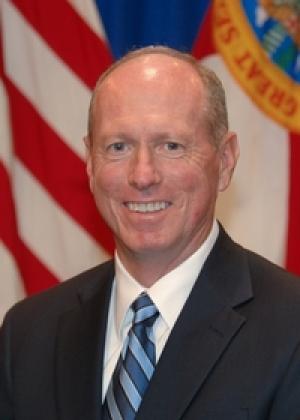
newly unemployed drug war bureaucrat seeks position
The
Florida Office of Drug Control is going out of business. The four-man fiefdom in the Sunshine State's drug war bureaucracy has fallen afoul of incoming Republican Governor-elect Rick Scott's war on state spending and was
notified late last month that it would be out of business come this month.
The office was established by Gov. Jeb Bush (R) and its FY 2010-2011 budget is $551,300. Its charge was reducing substance abuse in Florida and helping set state drug policy. The office put out an
annual report, as well as other reports, compiled statistics, lobbied for tighter restrictions on the state's burgeoning pain medicine clinics, and sought funds for prescription monitoring when the state legislature failed to allocate them.
Office director Bruce Grant, Florida's "drug czar," unsurprisingly thought the decision to disband the office was a mistake and sent the wrong message. "It kind of says this is not a priority issue," he said, adding that the state's drug problems are not going away. "It's not a war that's going to be over tomorrow."
The duties of the Office of Drug Control will likely be taken up by law enforcement and the state Department of Health, but that didn't mollify Grant. "Somebody's going to have to pick up the ball," he said. "Frankly, the Department of Health is not the aggressive type of agency to do it."
In the meantime, the incoming governor has surgically excised a layer of drug war bureaucracy and saved Florida taxpayers a half a million bucks a year in the process. It's not much, but it's a start.
back to top
The California Supreme Court ruled Monday that police can search text messages on the cell phones of people they arrest without obtaining a search warrant. Citing US Supreme Court precedent from the 1970s, the court held that reviewing cell phone text messages was a valid search incidental to arrest.

Cell phones the new snitches? (image via Wikimedia)
The ruling came in
California v. Diaz, in which Ventura County resident Gregory Diaz was arrested for selling Ecstasy to an undercover informant. Sheriff's deputies seized Diaz' cell phone along with six tabs of the drug. An hour and a half after the arrest, a detective without a search warrant looked at the phone' text message folders and found a coded message referring to Ecstasy sales.
When faced with the incriminating text message, Diaz admitted to doing the drug deal. He pleaded guilty to transporting a controlled substance, but reserved his right to appeal. He was sentenced to probation and did appeal the lawfulness of the cell phone search.
In a 5-2 decision, the state high court majority held that the search was allowable under US Supreme Court rulings that permitted the warrantless searches of personal property "immediately associated" with the arrested person, such as clothing or cigarette packs. Writing for the majority, Justice Ming Chin held that the cell phone was personal property, that it was immediately associated with Diaz, and that the search was therefore valid.
But in a dissenting opinion, Justice Kathryn Werdegar argued that searching the cell phone's text messages was "highly intrusive" and could have been carried out after police obtained a search warrant. Earlier US Supreme Court rulings should be reevaluated in light of technological innovations, she wrote.
Justice Werdegar may have been in the minority in the California case, but the high court in at least one other state has ruled that warrantless searches of cell phones incident to arrest are unconstitutional. In
Ohio v. Smith, decided in December 2009, the Ohio Supreme Court held that the warrantless search of a drug suspect's cell phone violated his Fourth Amendment protections against unreasonable searches and seizures.
"Once the cell phone is in police custody, the state has satisfied its immediate interest in collecting and preserving evidence and can take preventive steps to ensure that the data found on the phone is neither lost nor erased," Justice Judith Ann Lanzinger wrote for the majority in that case. "But because a person has a high expectation of privacy in a cell phone's contents, police must then obtain a warrant before intruding into the phone's contents."
With state supreme courts in two different states coming to starkly different conclusions about the constitutionality of warrantless cell phone searches incident to arrest, this issue would appear to be likely to be headed for resolution at the US Supreme Court.
back to top
It's a Texas trifecta this week, plus a Nashville cop buying guns for the cartels, an ATF agent with sticky fingers, and an upstate New York cop with several bad habits. Let's get to it:
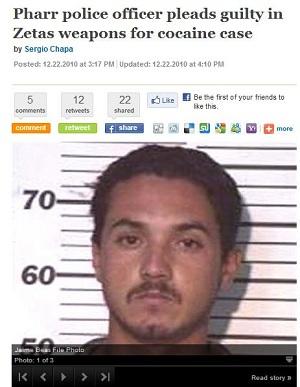
former police officer Jaime Beas, pleaded guilty to working with the Zetas
In Nashville, Tennessee,
a former Nashville police officer was found guilty December 20 of lying when purchasing weapons he intended to smuggle to Guatemala. Edwin
Ronal Morales was one of five people indicted in 2009 on charges of conspiring to illegal purchase weapons to be smuggled to Guatemalan drug traffickers. He was found guilty of two count of making false statement for falsely representing himself as the actual buyer when he was really giving the guns to a codefendant to be smuggled out of the country. He faces up to 10 years in prison on each count.
In Beaumont, Texas,
two Beaumont police officers pleaded guilty December 22 to misdemeanor charges of tampering with government records for leaving a confidential informant's name out of statements and testimony. Officers Brad
Bealieu and Eric
Heilman also had their peace officer's licenses suspended for six months.
In Cleveland, Ohio,
a Bureau of Alcohol, Tobacco & Firearms agent pleaded guilty December 22 to stealing money in an October drug raid. ATF Agent Steven Campbell was part of team raiding a marijuana dealer in nearby
Lyndhurst when he began stuffing cash into his pockets. A DEA agent on the raid turned him in. When confronted, Campbell insisted the only cash he had was his, but when he struggled to resist being handcuffed, $46,000 fell out of his pockets.
In McAllen, Texas,
a former Pharr police officer pleaded guilty December 22 to being on the payroll of the Mexican drug cartel the
Zetas. Former officer Jaime
Beas, 33, had been arrested in a July sting in which he thought he was trading cocaine for high-powered weapons and body armor destined for the
Zetas. He lived in a house owned by a
Zetas member. The house and four luxury cars were seized by authorities. He pleaded guilty to an organized crime charge.
In McAllen, Texas,
a former McAllen police officer was sentenced December 21 to 27 years in federal prison for drug trafficking conspiracy. Former officer Francisco
Meza-Rojas had led a group that smuggled cocaine and pot into the Rio Grande Valley, but after being arrested in 2006 broke out of jail and fled to Mexico until he was arrested in July. He had pleaded guilty earlier this year to conspiracy to possess cocaine and marijuana with intent to distribute.
In Niagara Falls, New York,
a former Niagara Falls police officer was sentenced December 22 to nearly 14 years in prison for tipping off drug dealers to police investigations, buying crack cocaine on duty, and groping a woman he had pulled over. Former officer Ryan
Warme had pleaded guilty in April to three felonies in exchange for a 10-year sentence, but got additional time added on after admitting threatening a prisoner who was set to testify against. He pleaded guilty to deprivation of civil rights under color of law, using and carrying his Niagara Falls Police Department-issued pistol during a drug transaction and conspiracy to distribute more than five grams of crack cocaine.
In Shakopee, Minnesota,
a former Carver County sheriff's detective was sentenced December 28 to six months in jail for stealing methamphetamine from the department's evidence vault in Chaska. Daniel Kahlow, an 18-year-veteran, went down after authorities noticed the drugs had been tampered with and saw him entering the vault in a surveillance video. He admitted ripping off the meth for his personal use and told investigators he had been smoking meth for about a year. Kahlow copped a plea to second-degree possession of meth. He begins serving his sentence this month.
back to top
A day after blowing the collective mind of the drug policy blogosphere by saying weed ought to be legalized, TV evangelist Pat Robertson was having second thoughts. The "700 Club" host and one-time presidential candidate told the New York Times the next day that he did not intend to suggest support for marijuana legalization, but only to question the severity of the punishments meted out to those who use or possess small amounts of the herb.
In a "700 Club" broadcast discussing the new conservative criminal justice reform group Right on Crime, Robertson launched into a heartfelt, if factually challenged, diatribe about the injustice of the country's marijuana laws.
"We're locking up people that take a couple puffs of marijuana and the next thing you know they've got 10 years," Robertson said. "They've got mandatory sentences; the judges throw up their hands and say there is nothing they can do. We've got to take a look at what we're considering crimes, and that's one of them. "I'm not exactly for the use of drugs -- don't get me wrong -- but I just believe that criminalizing marijuana, criminalizing the possession of of a few ounces of pot, that kind of thing is just costing us a fortune and ruining young people. Young people going to prisons, they go in as youths and come out as hardened criminals, and that's not a good thing," said the culturally conservative preacher.
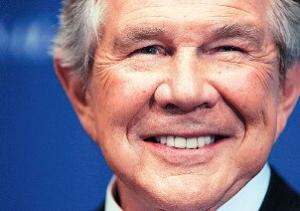
Pat Robertson (image via Wikimedia)
In reality, nobody is serving mandatory minimum 10-year prison sentences for simple marijuana possession. But still, the consequences of even a small-time pot possession arrest can be serious and life-long.
Wednesday, after the Internet hubbub over his "700 Club" remarks, a spokesman for Robertson emailed media outlets (including the StoptheDrugWar.org
Speakeasy blog) to clarify. He wasn't really calling for marijuana decriminalization, the spokesman said.
"Dr. Robertson did not call for the decriminalization of marijuana," the email explained. "He was advocating that our government revisit the severity of the existing laws because mandatory drug sentences do harm to many young people who go to prison and come out as hardened criminals. He was also pointing out that these mandatory sentences needlessly cost our government millions of dollars when there are better approaches available. Dr. Robertson’s comments followed a CBN News story about a group of conservatives who have proven that faith-based rehabilitation for criminals has resulted in lower repeat offenders and saved the government millions of dollars. Dr. Robertson unequivocally stated that he is against the use of illegal drugs."
Supporting pot legalization is still a bridge too far for the man who once famously
blamed legal abortion for Hurricane Katrina, but at least he's coming out for the reform of mandatory minimum drug sentences. That's as far as Right On Crime goes too, at least on its web page. In its issue pages on prisons and substance abuse, it calls for considering repeal of mandatory minimums and increased use of drug courts.
(Watch the CBN video footage here.)back to top
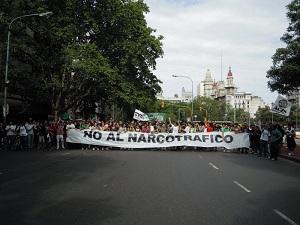
marching down Avenid Cinco de Mayo
About a thousand people took to the streets of Buenos Aires on December 18 to celebrate a year of marijuana activism and call for the right to grow their own plants. The march, led by student groups from around the country, ended at the Argentine Congress building, where speakers addressed the marchers. We present two dozen+ photos from the day here, courtesy Argentine activists.
Marching behind a banner saying "No to the Drug Traffic," the protestors criticized drug prohibition as fueling violent drug trafficking organizations. Another banner called for "An end to ignorance, the right to grow your own, and education for responsible consumption."
The
Argentine courts decriminalized marijuana possession for personal use last year, but cultivation remains a criminal offense. The Buenos Aires demonstrators want to see cultivation legalized as well.

marching down Avenid Cinco de Mayo
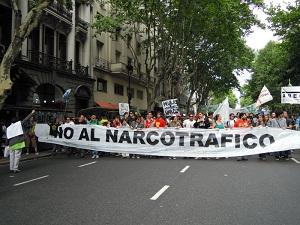
no to the black market drug trade

demonstrators mass in front of the Argentine Congress

in front of the Argentine Congress (courtesy Marcelo de Rienzo)
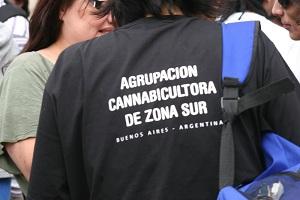
Marcha Cannabica II 2010-53_0.jpg

Rosario Association for Cannabis Studies

marching through Buenos Aires

a boisterous crowd

Cultivate your rights, Rosario

Cannabis Association of La Plata

protesting in downtown Buenos Aires

enough of ignorance, yes to grow your own, education for responsible consumption

Mike Bifari in Rosario Global Marijuana March t-shirt
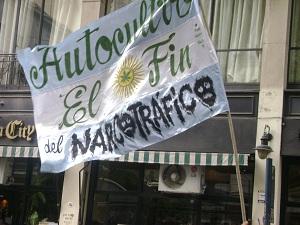
Growing your own -- the end of the black market drug trade
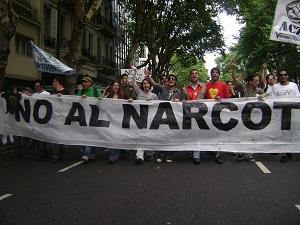
no to the black market drug trade

addressing the crowd
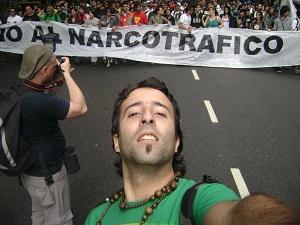
passions run high

in front of the Congress

activist Mike Bifari takes a load off his feet
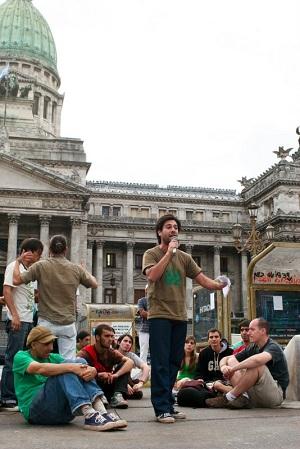
unidentified activist addresses the crowd
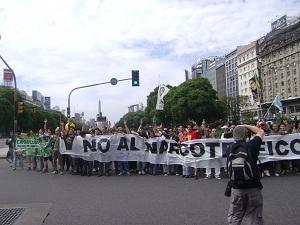
a wake up call for central Buenos Aires

marching through downtown

Justice in the province of Formosa, please!

unidentified activist (l), Mike Bifari (r)

in front of the Congress

DSC06114.JPG

Bifari addresses the marchers
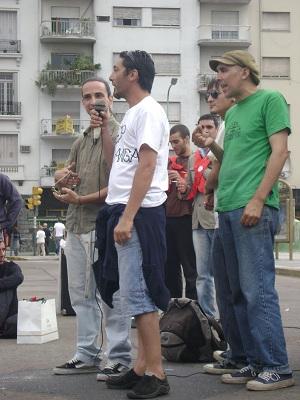
addressing the crowd

listening to the oratory
back to top
January 11, 1906: LSD inventor Dr. Albert Hofmann is born.
January 9, 1923: US Labor Secretary Davis endorses the idea of a national campaign against the peril of habit-forming drugs.
January 11, 1923: The New York Times publishes the article "Marihuana Is Newest Drug," and claims the State of New York has 50,000 drug addicts.
January 5, 1985: Colombia extradites four drug traffickers to Miami. Within days, the US becomes aware of the Medellin cartel's "hit list" which includes embassy members, their families, US businessmen and journalists.
January 4, 1986: Ronald Reagan in a radio address to the nation on relations with Mexico and Canada calls for efforts to be redoubled "to bring this illegal trade, this trafficking and the warping and destruction of human life, to the end."
January 8, 1990: General Manuel Noriega is convicted on eight counts of drug trafficking, money laundering, and racketeering, and sentenced to 40 years in Federal prison.
January 9, 1996: DEA agents in Miami arrest Jorge Luis Cabrera, a 1995 $20,000 donor to the Democratic Party who was invited to a Christmas party that year by Hillary Rodham Clinton. He is busted along with four partners in possession of 6,000 pounds of cocaine.
January 7, 1997: The US House of Representatives votes 226-202 in favor of 25 changes to internal House rules, including requiring House members and their staffs to be tested for illegal drug use.
January 5, 1998: In a speech given to his constituents, House Speaker Newt Gingrich (R-Georgia) calls on his fellow politicians to dramatically increase federal anti-drug efforts. "Just say, now, what does it take to seal off the border?" Gingrich asks. "What does it take to go after drug dealers? What does it take, frankly, to raise the cost for drug users?" Gingrich urges Drug Czar Barry McCaffrey to map a "World War II-style battle plan," to end drug use in America.
January 8, 1998: Rep. Bobby Moak's (R-Lincoln County) Mississippi House Bill 196 proposes "The removal of a body part in lieu of other sentences imposed by the court for violations of the Controlled Substances Law." Moak tells reporters that he introduced the legislation because he felt the state wasn't doing enough to combat drug use. Provisions in the bill mandate that the convicted person and the court "must agree on which body part shall be removed."
January 6, 1999: A lawsuit is filed in Paris accusing Fidel Castro of international drug trafficking.
January 6, 2001: General Barry McCaffrey steps down from his post as Director of the Office of National Drug Control Policy (ONDCP).
back to top


